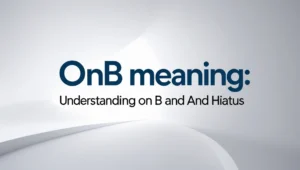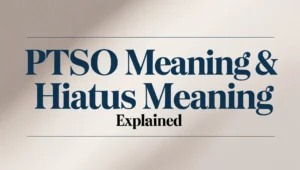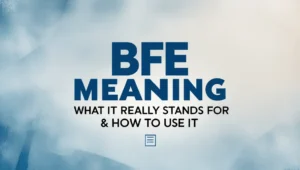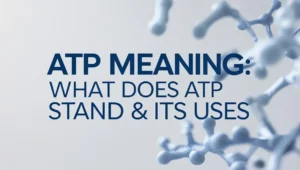In today’s fast-paced digital world, slang and abbreviations dominate text messages, gaming chats, and online communities. One of the most commonly used terms is AFK, short for Away From Keyboard. Whether you are a gamer, a social media enthusiast, or someone who just wants to keep up with modern chat lingo, knowing the AFK meaning is essential. This abbreviation isn’t just about being unavailable—it reflects how people communicate, express presence, and manage conversations in virtual spaces. In this guide, we will explore the complete meaning of AFK, its origins, everyday usage, and polite alternatives you can use in texting and gaming.
What Does AFK Mean?
AFK stands for Away From Keyboard. It is widely used in online gaming, forums, and text messaging to indicate that someone has stepped away from their device. Even though keyboards are not always involved today (since many chat apps are on phones), the term is still used universally.
The Origin of AFK
The phrase Away From Keyboard first became popular in the early days of online multiplayer gaming. Players needed a quick way to let teammates know they weren’t available without leaving the game. Over time, AFK entered mainstream internet culture and became a go-to expression in digital communication.
How AFK is Used in Gaming
In gaming, AFK is more than just a casual phrase. It can signal strategy, urgency, or even frustration. For example:
- A teammate might type “AFK 5 mins” to let others know they’ll be back shortly.
- Some games penalize players for being AFK too long because it impacts team performance.
- AFK farming or AFK botting are terms used when a player automates actions while being physically away.
AFK in Texting and Chat
Outside gaming, AFK is used in casual chats, work communication, or even group discussions. Examples include:
- Telling a friend “AFK, dinner time.”
- Informing colleagues “AFK for 10 minutes, brb.”
- Using AFK to politely pause a conversation without leaving the group.
Variations and Alternatives to AFK
While AFK is the most common, people also use similar expressions:
- BRB – Be Right Back
- GTG – Got To Go
- OOO – Out Of Office
- Offline – A direct alternative in formal chats
These alternatives are often context-dependent. For casual friends, AFK works best, while in a professional chat, “OOO” or “Offline” may sound more suitable.
AFK in Professional Communication
Though AFK started in gaming, it occasionally appears in workplace chats, especially in remote jobs. For example:
- “AFK for 30 mins, grabbing lunch.”
- “AFK until 2 PM, in a meeting.”
However, in formal emails or business communication, phrases like “Out of office” or “Stepping away” are better.
Common Misunderstandings About AFK
Some people mistake AFK for slang insults or assume it’s only a gaming term. In reality, AFK is a neutral, polite way to say you’re unavailable. Misunderstandings often occur when people unfamiliar with internet slang encounter the abbreviation.
Why AFK Remains Popular in 2025
Despite the rise of mobile communication, AFK has stood the test of time. Its simplicity, universal recognition, and quick typing convenience keep it relevant. Even in voice chats, people sometimes say “I’m AFK” to explain absence.
AFK vs. Idle vs. Offline
These terms often overlap but have subtle differences:
- AFK – You are away temporarily but intend to return.
- Idle – You are inactive but may still be at your device.
- Offline – You are completely disconnected from the chat or game.
Polite Ways to Use AFK in Different Contexts
Using AFK can be tricky depending on who you’re chatting with. Here are polite alternatives:
- In gaming: “AFK 2 mins, brb.”
- In texting: “AFK, call you later.”
- In work chat: “Stepping away, back soon.”
AFK in Memes and Internet Culture
AFK has also found its place in internet humor. Memes often exaggerate situations like “When your teammate goes AFK during a boss fight” to reflect frustration or comedy. This adds a cultural layer to the abbreviation, keeping it alive in digital conversations.
AFK in Modern Workspaces
With the rise of remote work, AFK has blended into work-from-home culture. Employees often use it casually in Slack, Teams, or Discord. For example, “AFK for lunch” is now as common as saying “BRB.”
How to Respond When Someone Says AFK
When someone types AFK, it’s polite to acknowledge. You could reply with:
- “Okay, take your time.”
- “Got it, I’ll wait.”
- “See you in a bit.”
This shows respect for their pause while keeping the conversation friendly.
The Future of AFK in Digital Language
Language evolves quickly, but AFK is likely here to stay. Its strong connection to gaming, texting, and work culture makes it a versatile abbreviation that adapts to new communication platforms.
Conclusion
The AFK meaning goes beyond just three letters—it represents modern communication, respect for others’ time, and adaptability in digital spaces. Whether you’re a gamer coordinating with teammates, an employee in a virtual meeting, or simply chatting with friends, understanding and using AFK makes conversations smoother. In a world where online presence matters, AFK bridges the gap between being present and politely stepping away.
FAQs
1. What does AFK mean in texting? AFK means “Away From Keyboard” and is used to show someone is temporarily unavailable.
2. Is AFK only for gaming? No, AFK is used in gaming, texting, work chats, and even social media to signal short unavailability.
3. Can AFK be used in professional emails? Not usually. In professional emails, phrases like Out of Office or Stepping Away are more appropriate.
4. What’s the difference between AFK and BRB? AFK means you’re away, while BRB (Be Right Back) suggests a quicker return.5. Will AFK still be used in the future? Yes, AFK has become a universal internet term and will likely remain part of digital culture.
















